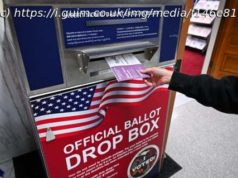In a chaotic capital, an annual ritual brings back a feeling of normalcy.
The distinguished gentlemen from the deep-red congressional districts swamped the aisle first — claiming their seats some five hours early with paper scraps, jackets and small electronics — earning televised cameos as President Trump arrived for the handshakes and great-to-see-ya’s.
A cleaning crew worked every corner of the grand chamber, running a vacuum over the royal blue carpet, kneading the underside of a railing with a rag. A man, wearing what appeared to be baseball batting gloves, adjusted a temporary light fixture beneath a less temporary chandelier in Statuary Hall. There, lawmakers spent their Tuesday afternoon staring into cameras and holding forth on what the president might say, should say, couldn’t say — and why it all mattered very, very much.
“It is what our country does,” Representative Steny H. Hoyer of Maryland, the Democratic whip, said of the exercise, strolling the Capitol as the finishing touches were applied. “And to that extent, it is reassuring.”
The state of our union is many things, depending on the day and the ZIP code. It can be buoyant, furious and glued, for better or worse, to the predawn emissions of an executive Twitter feed with a weakness for capital letters.
The State of the Union, in these Trumpian times, is something else: familiar, comfortable — the sort of thing that existed before President Trump came around and will, presumably, endure after he is gone.
“Nothing beats a presidential address to Congress,” said Senator Tim Scott, Republican of South Carolina, rebuffing a reporter’s suggestion that, given Mr. Trump’s alternative outlets for self-expression, the whole affair had lost some of its sheen as the peak event of the capital calendar.
That was another point to correct.
“It’s still an important event,” the senator said. “‘Peak events’ don’t typically happen in Congress.”
Yet if official Washington has generally failed to force Mr. Trump into its rhythms, the moment on Tuesday registered at times as an antique throwback, consumed by the kind of performative partisanship that has become an annual ritual. (Organizers did briefly seem intent on puncturing any myth of total normalcy when some tickets misspelled the occasion as the “State of the Uniom.”)
There would be clapping, and standing, and sitting, and standing again. Supreme Court justices would look sleepy. The vice president would gaze approvingly, nodding with force. It was ever thus.
Once again, sartorial choices doubled as political statements, with enough pins and stickers to qualify some lawmakers for Scout service. Many Democrats wore black to convey solidarity with the #MeToo movement. Some Republicans countered with red, white and blue.
Invited guests — immigrants and war heroes and business owners who appreciated the Republican tax cuts — walked the halls with their hosts.
At a news conference with young undocumented immigrants known as “Dreamers,” Senator Cory Booker, Democrat of New Jersey, let fly his full arsenal.
He quoted Langston Hughes. He referred to Representative Nancy Pelosi of California, the Democratic leader, aspirationally as “Speaker Pelosi.” He made something approaching a joke about Mr. Hoyer and his job title.
“I’m going to bring this great whippersnapper — excuse me — this great whip to the microphone,” Mr. Booker said.
“That was good!” Mr. Hoyer said mercifully. The room seemed skeptical.
But by then, the debate over Dreamers had already turned more combative. Representative Paul Gosar, Republican of Arizona, said he had contacted the Capitol Police and Attorney General Jeff Sessions with a request: Check the identification of all speech attendees and arrest “any illegal aliens” on the grounds.
“This is why we can’t have nice things,” Senator Jeff Flake, a retiring Arizona Republican who opposes Mr. Gosar’s hard-line immigration stance, wrote on Twitter in response.
“This is why you got forced out of office,” Mr. Gosar shot back.
The State of the Union was still five hours out. The state of our union had not changed much.






